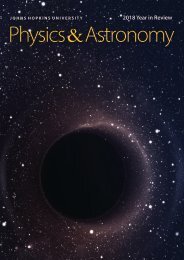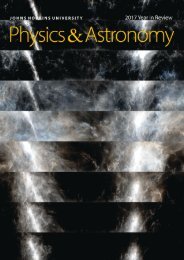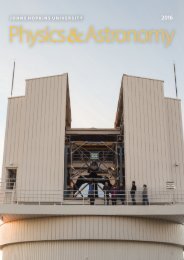Physics & Astronomy 2020 Year in Review
You also want an ePaper? Increase the reach of your titles
YUMPU automatically turns print PDFs into web optimized ePapers that Google loves.
Peter Armitage Awarded
Multidisciplinary Research
Grant from U.S. Army and
Department of Defense
Professor Peter Armitage has been
selected to lead a multi-institution
Multidisciplinary University Research
Initiative (MURI), funded by the
U.S. Army and the Department of
Defense. Armitage will lead one
of eight teams selected for the
initiative to develop disruptive
solutions to some of the most
promising challenges important
to Army modernization.
Specifically, Armitage’s team will
focus on the implementation of
axion electrodynamics in topological films
and devices. The MURI award is a $6.25
million-dollar effort over 5 years that will
investigate and utilize the electrodynamic
response of topological materials.
Peter Armitage Explores
the Future of the Correlated
Electron Problem with 46
Scientists Via Collaborative
Software
Professor Peter Armitage recently
finished editing a paper called “The
Future of the Correlated Electron
Problem.” This is a unique
manuscript that attempts to
summarize the collective views
of 46 junior scientists (beginning
assistant professors, postdocs,
and senior students) on the
future of correlated electron
systems. The content of the
paper is the result of the vigorous
discussions and deliberations that took
place at JHU during a three-day workshop
in January that brought together the
junior scientists. The manuscript was
written through collaborative writing
software such as Google Docs, Slack, and
Overleaf. 80% of the text was written
collectively in the first 72 hours following
the workshop. All 47 coauthors (including
Armitage) contributed to the writing and
proofing. Ultimately, this process resulted
in a unique paper that was made possible
by modern collaborative software.
Surjeet Rajendran Receives Two Gordon and Betty Moore
Foundation Fundamental Physics Innovation Awards
Associate Professor Surjeet
Rajendran is the recipient of
two Gordon and Betty Moore
Foundation Fundamental Physics
Innovation Awards this year.
These awards hope to
stimulate ideas on innovative
ways in which emerging
technologies can be used to
address pressing problems
in fundamental physics. The awards
support a variety of ways to bring people
together to discuss and collaborate on
ideas to advance fundamental physics.
Rajendran received
the Moore Foundation’s
Convening Award to host
a workshop dedicated to
discussing emerging trends
in theoretical particle physics
relevant to understanding
phenomena in our universe.
In addition, he received
the Moore Foundation’s
Visitor Award to visit Peter Graham at
Stanford, to develop new techniques for
laboratory detection of dark energy and
low-frequency gravitational waves.
Kirsten Hall Named Schmidt
Science Fellow
Kirsten Hall, who competed her PhD
with Associate Professor Toby Marriage and
Associate Professor Nadia Zakamska over
the summer, has been named one of the 22
early-career scientists who comprise the 2020
cohort of Schmidt Science Fellows, a program
of Schmidt Futures, in partnership with the
Rhodes Trust. The new Schmidt Science
Fellows aim to harness interdisciplinary
approaches to tackle long-term societal
challenges, including infectious disease,
climate change, and biodiversity loss.
Kirsten is an astrophysicist interested in
the evolution of galaxies over all of cosmic
time. She has combined state-of-the-art data
sets with advanced theoretical modeling
to uncover the relationship between starforming
galaxies and dark matter and to
measure the impact of growing supermassive
black holes on their host galaxies. As a
Schmidt Science Fellow, Kirsten now aims
to move into climate science to use her
expertise with large data sets to convert raw
data from atmospheric monitoring satellites
and ground-based data into actionable
information. By being able to trace emissions
back to their sources, she hopes to improve
vitally important climate models.
JOHNS HOPKINS UNIVERSITY PHYSICS AND ASTRONOMY 2020 YEAR IN REVIEW 11










